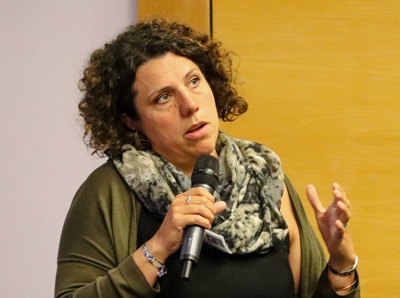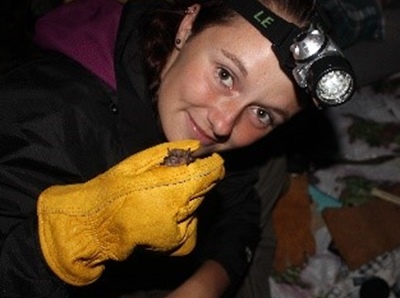
Conference connections
While we work together to create policies and environmental plans, to support women taking action to create a sustainable world, we also promote and support women in leadership positions by providing support to others looking to advance their careers.
Read the following case studies to see how women have benefited personally and professionally from attending the conferences.
Claire Brown, The University of Manchester
The Women in Environmental Science have been pivotal in helping me facilitate my change in career. I first attended the very first session in the summer of 2018. What I found so fascinating is that everyone was there like me were driven by their passion, i.e. their passion for making a difference and acting on that enthusiasm to change society. By having a workshop to enable discourse around a variety of topics led delegates to feel impassioned about choices that they could make.

One of the successes of these organised events, I feel, is that of networking. Being able to meet and have an arena for open discourse in a friendly atmosphere is one of the elements that I personally hold dear. For those who are new to their role, or looking for upward movement and progression, I am sure that these events have proven to be useful and practical.
In 2019, I was honoured to be able to help and support the 2nd WiES event and took on the role of a facilitator for one of the sessions. I was particularly interested to hear about some of the barriers that people had experienced or anticipated that they might experience in certain roles. My group was dynamic and forward in their opinions, but respectful and great at listening to others.
Danielle Hinchliffe, The University of Manchester
I was very interested to see the promoted WiES event advertising a workshop that would focus on encouraging and inspiring women in environmental sciences. The event itself was a series of presentations followed by question and answer sessions, with an additional breakout session to give participants a chance to engage in discussions around environmental science as an interdisciplinary research theme and the role of women. That said, not all participants were women – I recall a couple of men present which I personally found encouraging.

Professors Cathy Hollis and Alice Larkin gave motivational talks that shared their own personal experiences and advice for how to grow and navigate our career paths. The break-out sessions were particularly useful as each session involved specific themes that had been identified by Cecilia to be relevant, engaging and useful. It was a safe space where we could talk openly, passionately and productively about our research fields and identify sustainable developmental goals.
Overall, the event encouraged inclusiveness, positivity and strong work ethics. As a scientist who tackles environmental conservation issues at both local and international levels, I found the plenary from Dr Olutayo Adebowale particularly inspiring when she discussed her experience in leadership at global scales and how she was able to make such transitions in her career. For me, the take-home message was that as women we should look to each other for mentoring, support and development, so that we can climb the career ladder faster and more efficiently.
Sue Pascoe, Friends of the Earth, Safe Streets for Children group
It was inspiring to see what can happen in communities, and to see the efforts individual women are making. The projects that were highlighted in the sessions were very dear to my heart, and it was very encouraging to be asked to give feedback on the work we are doing in our local community in South Manchester. Sharing information makes for good communication and reinforces good work through example. Positive stories then get emulated by others: an example of this was the 'Walking Bus' project which we started at Alma Park school, other schools are following suit, and one school has now been promised a 'School Street' which will mean there is limited access to cars, thus increasing the Air Quality as well as safety for Children walking to school.
I sincerely hope that more such conferences like the WiES can happen, and that researchers can glean information from what is happening in the local environment. Universities need to be places of inspiration for us all, the flow of knowledge can then be attuned to meet the needs of the ordinary citizen, and we can all work together to create a better future.
Through activism, women can become involved with environmental science; the group that was set up to help children walk to school safely has grown in its outreach. Environmental Science is for everyone, and women definitely need to know they can use their knowledge to effect change.
